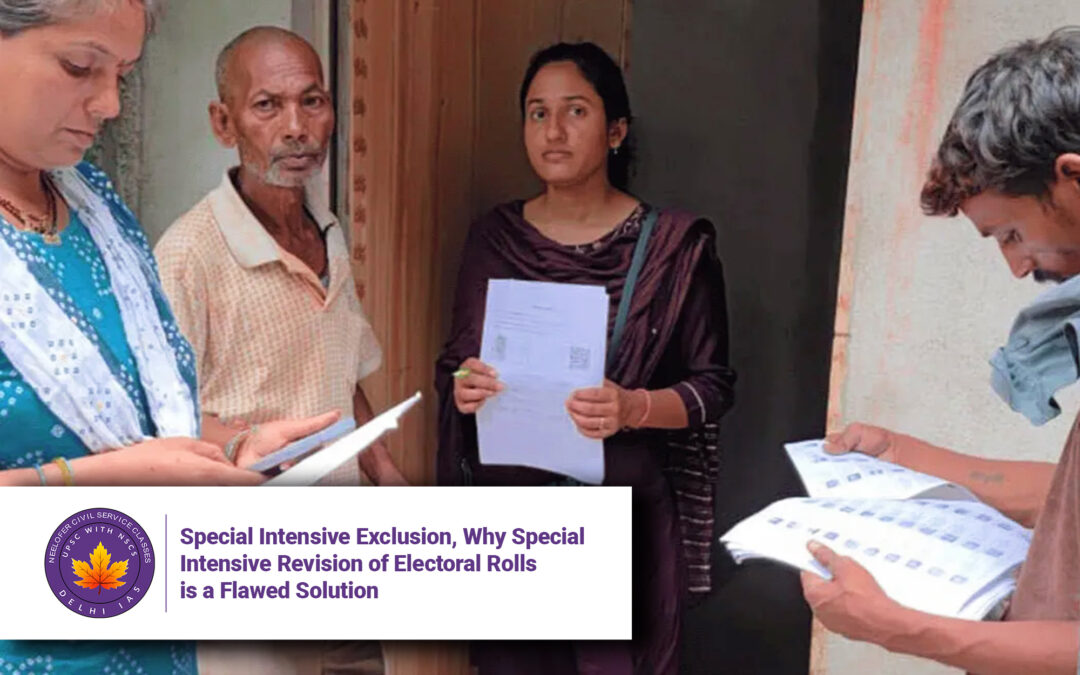Special Intensive Exclusion, Why Special Intensive Revision of Electoral Rolls is a Flawed Solution
Why in News?
In a recent press conference, the Chief Election Commissioner reiterated that the Special Intensive Revision (SIR) of electoral rolls was the ultimate solution to inaccuracies and flaws in voters’ lists. This statement comes amidst allegations of voter list fraud and manipulation, particularly after Rahul Gandhi’s exposure of irregularities in Mahadevpura, Karnataka. While the Election Commission (EC) claims SIR is essential to clean up electoral rolls, several experts, including political scientist Yogendra Yadav, argue that SIR is not the right solution. Instead, it worsens the very problem it seeks to solve.
Introduction
The accuracy and integrity of electoral rolls are the foundation of a free and fair democratic process. In India, allegations of missing voters, inflated lists, and targeted deletions have consistently plagued elections. Electoral rolls often fail to reflect the actual eligible voting population, leading to disenfranchisement. To address this, the EC introduced the concept of Special Intensive Revision (SIR)—a process aimed at identifying and removing inaccuracies in the rolls.
However, critics argue that the SIR, rather than strengthening electoral democracy, has become a tool of special intensive exclusion. Instead of solving the issue of voter roll inaccuracies, it risks aggravating them by introducing large-scale deletions and flawed procedures.
The Problem with Voters’ Lists in India
Electoral rolls in India have historically been riddled with errors. These include:
-
Missing Voters: A large number of eligible citizens, particularly from marginalized communities, find their names missing from the lists.
-
Multiple Entries: Cases of duplicate voters exist due to migration or clerical errors.
-
Targeted Deletions: Allegations of politically motivated deletion of names have surfaced, especially in urban areas.
-
Dead Voters: Names of deceased individuals often remain on the lists, distorting the actual number of voters.
Updating the electoral rolls is an ongoing process, but despite routine revisions, the problem persists. The Summary Revision undertaken every year allows for additions and corrections but often fails to capture the entire population accurately.
What is Special Intensive Revision (SIR)?
The Special Intensive Revision (SIR) is an extraordinary mechanism designed by the Election Commission to “clean up” voters’ lists. It involves a house-to-house enumeration process, verification of voters, and large-scale deletion of names that are deemed invalid.
The EC argues that SIR is essential when the credibility of electoral rolls is questioned. It is meant to address issues that regular summary revisions fail to capture.
However, the problem lies not in the intention but in the implementation and consequences. Instead of ensuring inclusion, the SIR often leads to mass exclusion.
Criticism of SIR – Why It Is Worse than the Disease
According to Yogendra Yadav, the argument supporting SIR is a “politician’s syllogism”:
-
Something must be done.
-
SIR is something.
-
Therefore, we must do SIR.
This reasoning is flawed because it does not ask whether SIR is the right solution. Critics emphasize that SIR is not an appropriate or sufficient method to fix the problem of faulty electoral rolls.
-
Based on Broad Assumptions:
SIR assumes that large-scale deletions are necessary, but this is not backed by data. Electoral rolls are better corrected through regular, precise updates rather than sweeping measures. -
Risk of Exclusion:
The house-to-house enumeration process often ends up disqualifying legitimate voters, especially those from marginalized groups such as migrants, urban poor, and minority communities. -
Unscientific Approach:
Unlike established statistical systems such as the Census or Registrar General of Births and Deaths, the SIR process lacks scientific accuracy. -
Administrative Failures:
The Election Commission has not created standardized protocols for declaring a voter as “dead,” “absent,” or “untraceable.” As a result, the process is arbitrary and prone to misuse. -
Focus on Deletions over Additions:
While the goal should be to include every eligible citizen, SIR disproportionately emphasizes deletions. For instance, in Bihar’s electoral rolls between June 25 and July 25, 65 lakh deletions were recorded compared to zero additions—highlighting its exclusionary nature.
Why Routine Updating is Better than SIR
Routine Summary Revisions may be slow and imperfect, but they ensure continuity and inclusiveness. These revisions allow voters to check their details, submit claims, and add new names.
In contrast, SIR prioritizes quick “clean-up” operations that rely heavily on field staff and door-to-door verification. This approach often results in mass errors and unjust exclusions rather than solving the root problem.
What the EC Should Have Done Instead
Critics argue that instead of resorting to SIR, the Election Commission should have focused on the following measures:
-
Strengthening Routine Updates:
Ensure timely, yearly summary revisions with modern technological support to minimize errors. -
Improving Enumeration:
House-to-house verification should be limited to additions of new voters rather than large-scale deletions. -
Transparent Protocols:
Create clear and documented guidelines for identifying “dead,” “absent,” or “moved” voters to prevent arbitrary removals. -
Technological Integration:
Use Aadhaar linkage, census data, and the Registrar of Births and Deaths records to cross-check voter information scientifically. -
Independent Audits:
Conduct third-party audits of electoral rolls with the help of national statistical organizations to ensure neutrality.
Broader Democratic Concerns
The controversy over SIR is not just about administrative efficiency; it is about democratic rights. Excluding genuine voters undermines the principle of universal suffrage. In a country like India, where elections are fiercely contested, the manipulation or inaccuracy of electoral rolls can decisively impact results.
Moreover, trust in electoral institutions is essential for democracy. If citizens believe their right to vote is being curtailed through faulty deletions, it can erode confidence in the entire electoral process.
Conclusion
While India’s electoral system needs serious reforms to maintain accurate and inclusive rolls, the Special Intensive Revision (SIR) is not the right solution. It aggravates the problem instead of solving it by focusing excessively on deletions, lacking transparency, and risking disenfranchisement.
The way forward lies in scientific, transparent, and inclusive updating processes, not in exclusionary shortcuts. As Yogendra Yadav rightly argues, the SIR is not a medicine for the disease but rather a dangerous steroid that worsens the condition.
India needs electoral reforms that strengthen democracy by ensuring that every eligible citizen has an equal opportunity to vote, rather than creating new mechanisms of exclusion.
Q&A Section
Q1. What is Special Intensive Revision (SIR) of electoral rolls?
A1. SIR is an extraordinary process initiated by the Election Commission to clean up electoral rolls through house-to-house verification and large-scale deletion of inaccurate entries. It is meant to address voter list inaccuracies beyond the scope of routine summary revisions.
Q2. Why is SIR criticized by experts?
A2. Experts argue that SIR leads to large-scale exclusions of genuine voters, lacks scientific accuracy, and disproportionately emphasizes deletions over inclusions. Instead of solving the problem, it worsens it by undermining universal suffrage.
Q3. What alternative methods are suggested for improving electoral rolls?
A3. Alternatives include strengthening annual summary revisions, using modern technology, creating transparent deletion protocols, integrating census and Aadhaar data, and conducting independent audits.
Q4. What recent example highlights the flaws of SIR?
A4. In Bihar (between June 25 and July 25), the EC reported 65 lakh deletions and zero additions in electoral rolls, showing that SIR prioritizes exclusions over inclusions, leading to disenfranchisement.
Q5. Why is the accuracy of electoral rolls important for democracy?
A5. Electoral rolls determine who can vote in elections. Inaccurate or exclusionary rolls disenfranchise citizens, distort election outcomes, and erode trust in democratic institutions, directly undermining the principle of universal suffrage.







